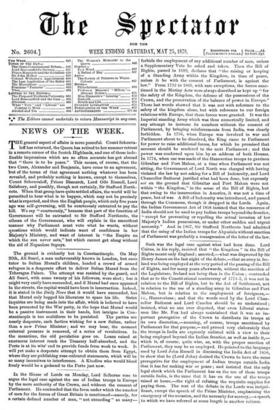Such was the legal case against what had been done.
Lord Cairns, in his reply, insisted that " the Kingdom " in the Bill of Rights meant only England ; asserted,—what was disproved by Sir Henry James on the last night of the debate,—that an army in Ire- land was being employed at the very period of the passing of the Bill of Rights, and for many years afterwards, without the sanction of the Legislature, Ireland not being then in the Union ; contended that as to the Constitutional controversy of 1774-5, it was not in relation to the Bill of Rights, but to the Act of Settlement, not in relation to the use of a standing army in Gibraltar and Port Mahon, but in relation to the employment of foreigners,- i.e., Hanoverians ; and that the words used by the Lord Chan- cellor Bathurst and Lord Camden should be so understood ; insisted, what no one ever disputed, that even Liberal states- men like Mr. Fox bad always maintained that it was an im- portant prerogative of the Crown to distribute its troops at its own discretion,—meaning, of course, troops sanctioned by Parliament for that purpose,— and proved very elaborately that the troops in India are expressly enlisted with a view to their being employed beyond the Indian frontier, as well as inside it,— which is, of course, quite wise, as, with the proper sanction of Parliament, they may be so employed. Ho pointed to the language used by Lord John Russell in discussing the India Act of 1858, to show that he (Lord John) desired the Crown to have the same prerogative for the employment of Indian troops outside India that it has for making war or peace ; and insisted that the only legal check which the Parliament has on the use of these troops outside India, is the same that it has on the use of the troops raised at home,—the right of refusing the requisite supplies for paying them. The rest of the debate in the Lords was insigni- ficant, except the speech of the Prime Minister, emphasising the emergency of the occasion, and the necessity for secrecy,—a speech to which we- have referred at some length in another column.


































